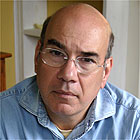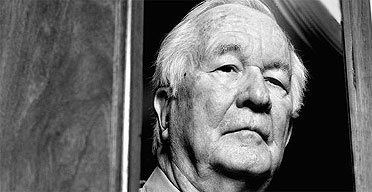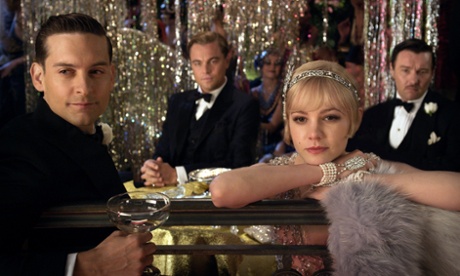William Styron: 'face chiseled from a granite block' ... Photograph: Eamonn McCabe/Guardian
The death of an author you have admired over many years is always a quiet blow. One feels the world turning more swiftly, and knows that a special voice has fallen silent forever. I felt something of this when I heard this morning that William Styron had died. I read his well-known novels - Lie Down in Darkness, The Confessions of Nat Turner, and Sophie's Choice - a long time ago, but they have stayed in my head, as brave and original works.
I met Styron only once, decades ago, in New Hampshire. He came to speak to students at a college where I was teaching, and everyone responded to him warmly. He struck me as an astonishingly confident man: face chiseled from a granite block; voice firm but kind. After his talk, we walked together across the campus. I had only just finished writing my first novel, I told him. With a candour that still surprises me, he turned and said, "Always go your own way, and do what most interests you. There is no other possibility for good writing."
He certainly followed his own advice. An officer in the Marine Corps during the second world war, he fought in the Pacific and was among those soldiers who eventually occupied Japan. The bombing of Hiroshima affected him powerfully, and he began to write Lie Down in Darkness - the story of a young woman called Peyton Loftis and her tumble into madness, aided by her parents and the world at large - as soon as he returned to the US. It is a lyrical book suffused with an intense aura of melancholy.
Two further novels followed, neither of which attracted much of a following; but The Confessions of Nat Turner (1967) was - at first - a huge hit, winning the Pulitzer Prize. It's a "true" novel, retelling the story of a famous black slave and his rebellion in the antebellum years. The problem, of course, was that Styron - a Southern white man - had no personal claim to this material. A whole book appeared a year later, in which 10 African American writers attacked the book's credibility. Styron was deemed to have misjudged black psychology, and to have no ear for dialects. I myself found the portrayal of Turner somewhat clichéd; but I admired his willingness to go where he pleased, and to imagine history as he would, regardless of his own background.
The same issue arose with Sophie's Choice (1979), a remarkable novel about a young Southern writer living in Brooklyn after the war, who meets a beautiful woman who has survived the Nazi death camps. It seemed astonishing to me at the time that Styron would so courageously take on this material, writing about major events of recent history with such audacity. Critics wondered if Styron had the right to imagine the death camps when, of course, he had never seen them at first hand. But he did so brilliantly, I think. That book is part of the permanent treasures of American literature.
Styron suffered from alcoholism and depression - much like his father, a shipyard engineer from Virginia, where Styron grew up. He was not prolific, and struggled to write anything of note after Sophie's Choice. His only book of consequence in the later years was Darkness Visible, a harrowing memoir of his battles with depression and alcohol. He once said that this book "all unwittingly ... amounted to a Rosetta stone for my other work." This may be true. I found the book as depressing as the subject, and prefer the novels, which I will soon read again.





